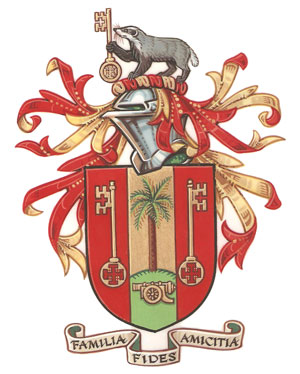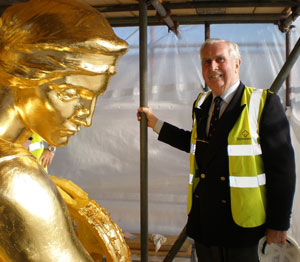I want to tell you about my father, John Anthony Sankey PhD CMG. Dad was a staunch Roman Catholic – ‘cradle to grave’ is the phrase. Today, 1st November, is celebrated as ‘All Saints Day’ by Catholics, so seems like a good day to do it.
I’m going to focus on three lessons from Dad that I use all the time in my work:
- Try Sankey’s suggestion – a quick and valuable tip when editing documents.
- Consider level 3 diplomacy – an approach to persuasion that’s worth knowing about.
- Be genuinely interested in everyone – a characteristic that Dad had all his life, and that on my better days I hope I’ve inherited.
John Sankey was a diplomat and historian

But first, I’ll explain why I’m writing this. Dad died from Covid pneumonia on 26th August 2021. He was 91. For the last year of his life, he was the main carer for my mother who has been in poor health. We had no idea how much his own health had been undermined by that effort, and when he tested positive for Covid-19 on 13th August it swept him away in less than two weeks despite his double vaccination.
He described the previous 90 years as falling into three 30-year periods. The first 30 were education, military service and his first job at the Colonial Office where he met his future wife, my mother.
The second 30 covered his life in the diplomatic service as he transferred to the then Foreign and Commonwealth Office (FCO) and my parents travelled to serve in countries around the world, accompanied at various times by their four children. He did an interview about his diplomatic career for the British Diplomatic Oral History Programme – a long read that captures his lively opinions about diplomacy. He was awarded a CMG for his service.

And the final 30, alongside his retirement jobs, were mostly about his research into the sculptor Sir Thomas Brock including completing his PhD. He contributed dozens of articles about Brock to the Victorian Web which also has his academic biography. One of his proudest moments was in 2011 when, already in his 80s, he was allowed to ascend 17 ladders within the scaffolding around the Victoria Memorial to see the refurbishment of the enormous monument including the regilding of Victory at the top.
Now onto the three lessons.
Try Sankey’s suggestion
Dad spent decades editing – creating speeches, writing ‘dispatches’ (notes from a British Embassy or British High Commission back to the FCO), and hundreds of other types of document. He observed that the opening sentence is usually the weakest part. His suggestion is to get rid of it.
Sankey’s suggestion:
Delete the first sentence. Your writing will be better without it.
It’s remarkable how well Sankey’s suggestion works. Often, I take it further and remove the entire first paragraph, sometimes the whole first page.
Occasionally, if the writer I’m working with is a little sensitive, I’ll say “let’s just move this to the end for the moment and then see where it will work best”. By the time we get to the end, we usually agree that it can go.
Consider level 3 diplomacy
From time to time, I’d chat with Dad about the challenges of persuading clients or colleagues to change their minds about some proposed course of action that seemed to me to be unlikely to work as they hoped. I tended to use words like ‘disastrous’.
Dad patiently explained to me that telling someone that they have had a bad idea is unlikely to be successful. He described three levels of diplomacy that he had developed over many years of persuading senior officials to change their minds about ideas that were not regarded as helpful by the UK government.
To my regret, I’ve forgotten levels 1 and 2. But level 3 was the important one and stuck with me. I can hear him telling me now.
Level 3 diplomacy.
Enthusiastically adopt the proposed idea. Press for it. Seek to remove any obstacles. Let the person who had the idea argue you out of it.
Level 3 diplomacy doesn’t come easily to me. I find it hard to let go of my own objections, to remove words like ‘bad’ from my vocabulary, and to say things like “yes, let’s do it” instead.
But when I’ve tried it, I’ve discovered that it works. First of all, it’s much more fun to be positive about something. Secondly, the removal of obstacles – for any reason – is usually worthwhile. Thirdly, it’s conceivable that the person who had the idea is, in fact, correct and it turns out to be a good idea after all. (That’s the theory, anyway). But finally, and most importantly, taking the idea seriously and working on it quickly usually exposes its flaws with much less effort than trying to fight it.
Be genuinely interested in everyone
After one tiny and very easy tip, and one rather more difficult but useful possible tactic, I’d like to come to the essence of Dad, the characteristic that I think was the foundation of my parents’ very successful 63-year marriage: their genuine interest in everyone. Everyone!
Dad had the opportunity to meet many famous and influential people. On one slightly surreal occasion in the late 1970s, living in the Netherlands, Mum was busy with one of her charitable things so he asked me if I’d like to accompany him to a visit to the Dutch Fruit and Vegetable Growers Association. They had organised a competition for British schoolchildren and he had been invited to the prizegiving – which is how I met Julie Andrews, who was taking a break from making movies to present the competition prizes. He was completely relaxed talking to a famous actor and to the dignitaries present. But also: he thoroughly enjoyed chatting to the children.
This year, in the many taxis taking Dad to visit Mum in hospital, we learned the life story of every driver – their place of birth, their family history, their current interests – and Dad would find some connection. Maybe their family came originally from Africa and he’d recall visiting their country many years earlier. Maybe they’d driven up from ‘south of the river’ and he’d mention his Woolwich childhood. Sometimes it was a relevant snippet of news. The point was: he wanted to know something about them because he was interested in everyone he met, whatever their role was and however brief their time together.
That’s the lesson I’ll try to keep with me: be genuinely interested in everyone.
